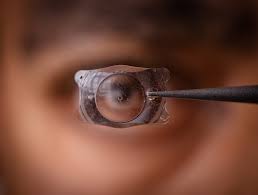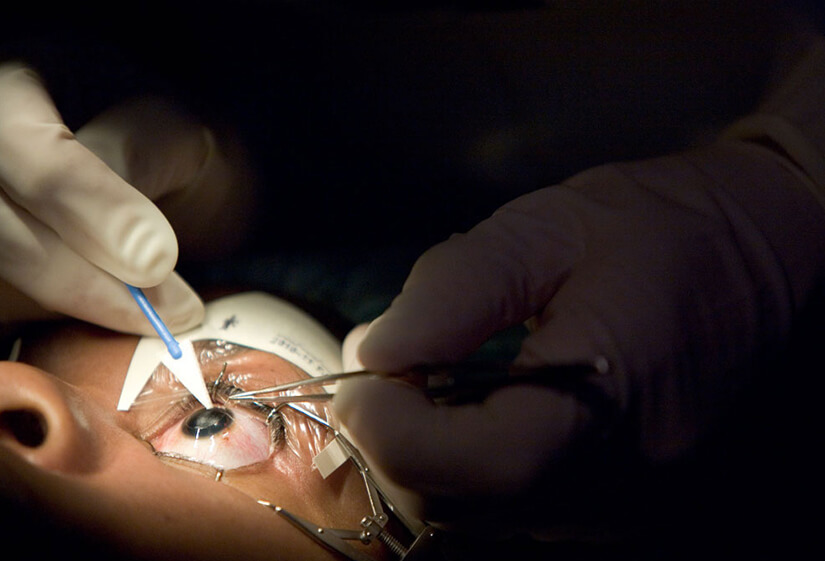The Complete Guide to ICL Lens Cost and Surgery: What You Need to Know
Introduction
Doctors use the Implantable Collamer Lens (ICL) to correct refractive vision issues such as nearsightedness (myopia), farsightedness (hyperopia), and astigmatism. Unlike traditional contact lenses that sit on the eye’s surface, ICLs are implanted inside the eye, between the iris and the natural lens. This surgery is a popular choice for people who are not ideal candidates for LASIK or PRK due to factors like thin corneas or high prescriptions.
Surgeons make ICLs from a biocompatible material called collamer, ensuring they are compatible with the eye and providing benefits like UV protection. They can also remove or replace the lens if necessary, offering flexibility for the patient.
How Does ICL Work?
ICL surgery works by implanting a lens directly into the eye to correct vision. Here’s a quick breakdown of the process:
- Pre-surgery Evaluation: Before the surgery, a detailed eye exam is performed to assess whether you’re a good candidate for ICL. Your doctor will take measurements of your eye, including the thickness of your cornea and the curvature of your eye, to determine the appropriate lens prescription.
- The Surgery: The procedure itself is relatively quick, usually lasting around 15 to 30 minutes. During the surgery, a small incision is made in the cornea to insert the lens. The surgeon will position the ICL between the natural lens and the iris, where it stays securely in place.
- Post-surgery: After the surgery, you will be monitored for any signs of complications, and your vision will start to improve within a few days to a week. Most people can resume normal activities within a few days, but complete healing may take a few weeks.

ICL vs. LASIK: Which is Better?
ICL and LASIK are both popular vision correction procedures, but they have key differences. Here’s a comparison to help you decide which might be the right choice for you:
- Procedure: LASIK reshapes the cornea using a laser to improve vision, while ICL places a lens inside the eye to correct vision.
- Suitability: ICL is often recommended for those with high prescriptions, thin corneas, or dry eye issues who may not be ideal candidates for LASIK.
- Reversibility: ICL lenses are removable, which means that if there are complications or you want to change prescriptions, they can be adjusted. LASIK, however, is irreversible.
- Recovery Time: Both procedures generally have short recovery times, but LASIK patients may experience quicker visual recovery, while ICL patients may have slightly longer healing times.
Factors Affecting ICL Lens Cost
The cost of ICL surgery can vary widely depending on several factors. These include:
- Location: The cost of surgery can differ significantly depending on where you live. Cities with a higher cost of living tend to have higher surgery prices.
- Surgeon Experience: Surgeons with more experience or those who are highly reputed may charge more for their services.
- Technology and Equipment: The use of advanced technology such as high-precision lasers and imaging systems can increase the overall cost of the procedure.
- Clinic Reputation: Well-established clinics with a strong track record may charge a premium for their services.
- Aftercare and Follow-ups: Post-surgery care, follow-up visits, and medications may add to the total cost of the procedure.
Average ICL Lens Cost in Different Countries
The cost of ICL surgery can vary significantly across countries. Here’s an estimate of the average costs:
- United States: In the U.S., ICL surgery typically costs between $3,000 and $5,000 per eye.
- Canada: ICL surgery in Canada can range from $2,500 to $4,000 per eye.
- United Kingdom: In the UK, the procedure may cost between £2,000 and £3,500 per eye.
- Australia: ICL surgery in Australia typically costs between AUD 4,000 and AUD 6,000 per eye.
- India: India offers some of the most affordable options, with costs ranging from ₹80,000 to ₹150,000 per eye.
Breakdown of ICL Surgery Costs
This breakdown outlines the general costs associated with ICL surgery:
- Surgeon’s Fee: $1,500 – $2,500 per eye (this can vary depending on experience and reputation).
- Pre-surgery Consultation: $100 – $500.
- ICL Lens: $1,000 – $1,500 per eye.
- Operating Room Costs: $500 – $1,000.
- Post-surgery Care: $200 – $300.
Additional Costs to Consider
The total price depends not only on the surgery itself but also on other factors that can affect the cost:
- Medications: You may need prescription drops or antibiotics post-surgery, which can cost $50 – $200.
- Follow-up Appointments: Some clinics include follow-up visits in their initial cost, while others charge extra. Typically, follow-up visits can range from $100 to $300.
- Surgical Complications: If there are any complications, additional costs for treatments or corrective procedures may arise.
Does insurance cover ICL lens surgery?
Most insurance providers consider ICL surgery an elective procedure and do not cover it, especially when performed for cosmetic purposes. However, some insurance policies may cover part of the cost if the surgery is medically necessary, such as for patients who are unable to wear glasses or contact lenses. It’s important to check with your insurance provider to see if there are any exceptions or partial coverage options available.
ICL Lens Financing Options
Since ICL surgery can be a significant financial investment, many patients opt for financing options to spread the cost over time. Common financing methods include:
- Medical Financing Plans: Many clinics offer financing plans with low interest rates or promotional offers.
- Personal Loans: You can take out a personal loan from a bank or financial institution.
- Credit Cards: Some people use credit cards with 0% interest promotional periods to finance the procedure.
Is ICL Lens Worth the Cost?
The decision to get ICL surgery depends on your individual needs and lifestyle. If glasses or contacts no longer meet your needs and LASIK isn’t suitable, consider ICL as a life-changing solution. Additionally, ICLs offer a high level of precision and a quick recovery time, making them a worthy investment for many people.
However, the high cost can be a deterrent for some. Weighing the long-term benefits, such as improved quality of life and vision, against the upfront cost is key to making an informed decision.
How to Find the Best ICL Surgeon?
Finding a qualified and experienced ICL surgeon is critical for the success of the procedure. Here’s what to look for:
- Certifications and Experience: Look for a surgeon who specializes in refractive surgeries and has experience specifically with ICL procedures.
- Reputation: Read reviews, ask for patient testimonials, and check online ratings to gauge a surgeon’s reputation.
- Consultation: A good surgeon will offer a thorough consultation, discuss the risks and benefits of the surgery, and address any concerns you may have.
- Technology: Ensure the surgeon uses up-to-date equipment and technology to ensure the best possible outcome.
Preparing for ICL Surgery
Before undergoing ICL surgery, there are a few steps you need to follow:
- Pre-Surgery Consultation: Your eye doctor will assess your vision, eye health, and suitability for the procedure.
- Eye Measurements: Your doctor will take precise measurements of your eyes to select the correct ICL prescription.
- Stop Wearing Contacts: Your doctor may ask you to stop wearing contact lenses for a few weeks before the procedure to ensure accurate measurements.
Recovery and Aftercare Costs
Recovery after ICL surgery is generally quick, but you’ll need to follow some aftercare instructions:
- Post-surgery visits: You’ll have follow-up visits to monitor healing.
- Medications: Prescription eye drops and antibiotics will be required to prevent infection and reduce inflammation.
- Activity Restrictions: You may be advised to avoid strenuous activities and swimming for a few weeks.
The overall cost of aftercare can range from $200 to $500.
Conclusion
ICL surgery offers a fantastic alternative to glasses and contact lenses for those with high prescriptions or unsuitable conditions for LASIK. However, the cost of the procedure can be a significant consideration. Understanding all the factors that contribute to the cost, including the surgeon’s experience, location, and additional aftercare, can help you make an informed decision. Financing options are available, but it’s essential to assess whether the procedure is worth the cost for you personally.
Author Details:
Dr. Sushruth Appajigowda holds a prominent position as a Cornea, Cataract, Glaucoma, and LASIK Surgeon in Bangalore. He serves as the chief Cataract and Refractive surgeon at Vijaya Nethralaya Eye Hospital, Nagarbhavi Bangalore. Renowned as one of the finest LASIK surgeons nationwide, he brings with him over 12+ years of experience across multiple LASIK platforms, including ZEISS, ALCON, SCHWIND, AMO, and Bausch and Lomb. Having successfully conducted over 5000 LASIK procedures, Dr. Sushruth holds the title of a Certified Refractive Surgeon and a Fellow of the All India Collegium Of Ophthalmology. Furthermore, he stands as a distinguished speaker at various National and International Forums, using his expertise to guide you in selecting the most suitable procedure based on your health requirements.

http://vijayanethralaya.com/link-in-bio/
FAQs
- Is ICL surgery covered by insurance? Most insurance plans do not cover ICL surgery, as it is considered an elective procedure. However, some may cover part of the cost if it is medically necessary.
- How long do ICL lenses last? ICL lenses are designed to last for many years, and they can be replaced if necessary. Most people keep their ICL lenses for life.
- Is ICL surgery safe? Surgeons consider ICL surgery safe and effective when performed by an experienced professional. However, like any surgery, it carries risks such as infection or complications.
- Can I drive after ICL surgery? Most people can resume driving within a day or two after surgery, but it’s essential to follow your surgeon’s advice regarding recovery times.
- What are the risks of ICL surgery? While complications are rare, potential risks include infection, increased eye pressure, cataracts, or retinal detachment. Always discuss the risks with your surgeon.












